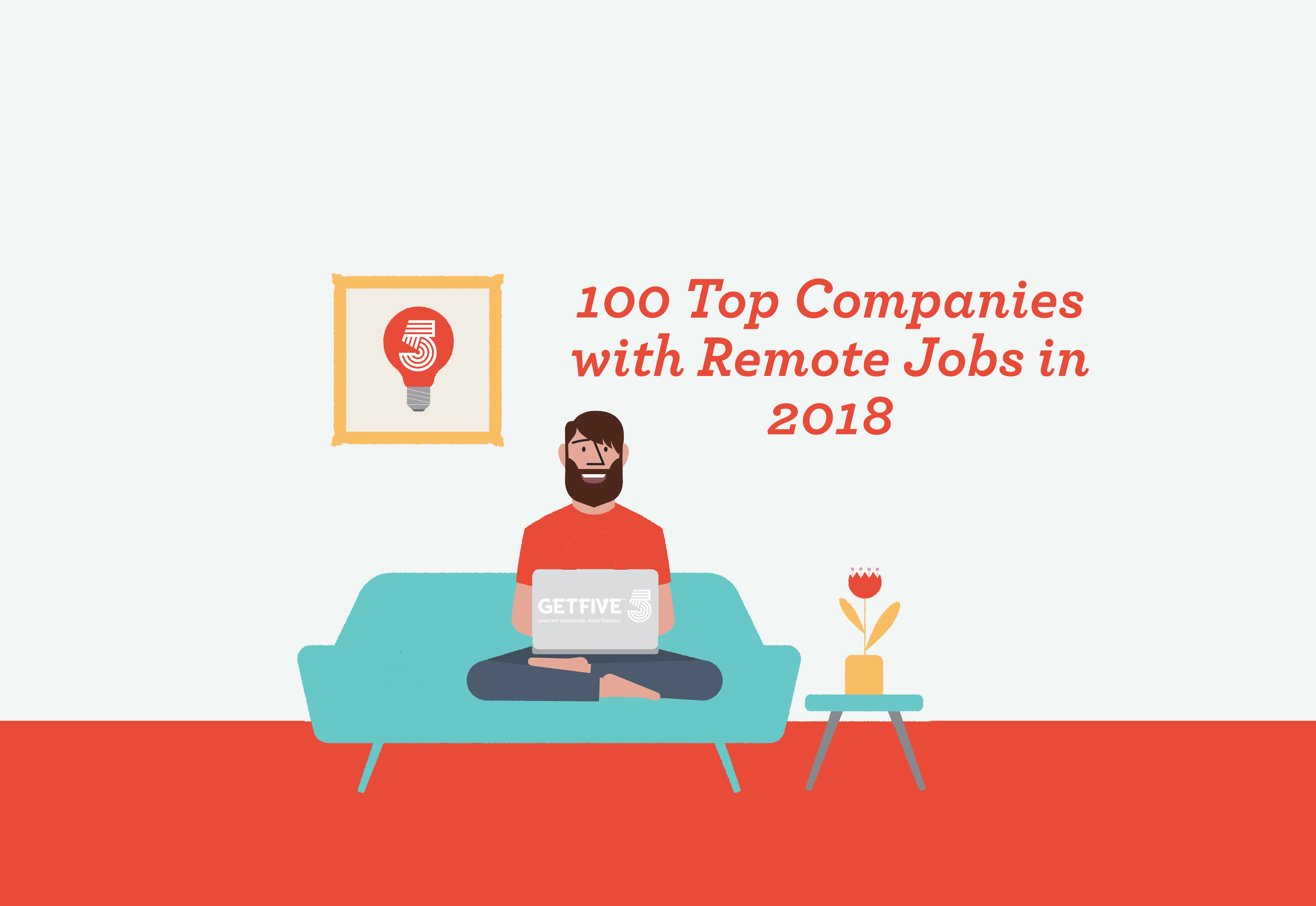Written by Brie Weiler Reynolds, Senior Career Specialist at FlexJobs
Over the last several years, remote work has grown into a lasting trend, offering benefits to both companies and professionals. More people are working remotely and more companies are offering remote jobs.
But if you’re interested in working remotely, where do you start? These 100 companies are probably a good place because they’ve been recognized for offering the most remote job listings in 2017, signalling their commitment to remote work and making them a good bet for remote opportunities this year.
Each year for the past five years, FlexJobs has analyzed the job posting data for over 49,000 companies, to find the 100 companies that posted the most remote-friendly job openings throughout the last year. Remote-friendly means the openings must offer some level of telecommuting (the levels are 100%, mostly, some, or optional telecommuting).
Along with that information, FlexJobs has found that five of the fastest-growing remote career categories are therapy, virtual administration, client services, tutoring, and state and local government. While a wide variety of jobs can be done from home, the 20 most common telecommuting job titles include teacher, writer, developer, analyst, sales representative, nurse, accountant, and program manager.
From the full list of 100 companies, here are the top 25 companies with remote jobs, and some key tips for finding your own remote job!
- VIPKID
- Appen
- Conduent
- Rev
- Liveops
- TTEC
- Amazon
- SYKES
- Dell
- Working Solutions
- LanguageLine Solutions
- Kelly Services
- Intuit
- UnitedHealth Group
- Williams-Sonoma
- Convergys
- Aetna
- Cactus Communications
- Kaplan
- BroadPath Healthcare Solutions
- Hilton
- Commonwealth of Virginia
- Leidos
- Robert Half International
- K12
Where you live may also affect your remote job search because 95% of remote jobs have some kind of location requirement. These are largely due to things like payroll taxes, employment laws and regulations, and where the company is based if they have brick-and-mortar operations.
FlexJobs also analyzed data from the U.S. Census Bureau to find out which U.S. states have the most remote workers.
Of note in the top 10 states, whose rankings changed little since 2013, New Hampshire moved up from number 8 to number 5 because of an almost 13% increase in telecommuting. Outside of the top 10 states, Wyoming had the largest increase in telecommuting in the last three years, with almost 30% more telecommuters in 2016 than 2013, which moved the state from 38 on the list to 19.
Rhode Island experienced a 19.4% increase in telecommuting, and other locations with fast-growing telecommuting populations include the District of Columbia (up 18.2%), Delaware (up 16.2%), Alabama (up 16%), Mississippi (up 15.8%), Arkansas (up 14.3%).
Tips for Landing Your Own Remote Job
Whether you’re currently searching for a new job or just thinking about jumping into the job market, there are a few key tips you should know when searching for remote work, in particular.
- Understand the remote job market. The good news is that the remote job market is much like the overall job market right now: it’s offering a lot of opportunity. Based on the remote jobs posted by the top 100 companies, the top career fields for remote work are medical and health, computer and IT, education and training, sales, customer service, accounting and finance, and travel and hospitality.
- Use the right keywords to search job search websites and search engines. The remote job market offers a lot of legitimate opportunities, but it is also the target of many job scams. If you want to work from home, use keywords like “telecommute job,” “remote job,” “distributed team,” and “virtual job.” Avoid phrases that scammers use, specifically “work from home” and “work at home.”
- Update your resume and online profiles to include skills and tools related to remote work. Write about your remote job-friendly skills, such as independent work, time management, written and verbal communication, troubleshooting technical issues, and being proactive with questions and ideas. Include a list of remote-specific technology you’re familiar with, such as instant messaging (Slack, Google Chat), file sharing (Dropbox), document collaboration (Google Drive), video conferencing (join.me, GoToMeeting, Skype), and other remote collaboration tools.
- Utilize your network. Once you start asking, you may be surprised by how many people you already know who are working remotely at least part of the time. Reach out to your professional network to find out who’s already working from home, how they got there, and what their tips are for you to find the same type of work arrangement.
Finally, a remote job search is very similar to a traditional job search in a few ways:
- You’ll need to apply to each job, using a tailored resume, cover letter, and potentially other application materials.
- You’ll interview for the job, typically over phone or video conference (though sometimes in-person).
- You need to sell yourself as the person for the job based on your skills and experience. But you’ll also need to show your ability to do the job remotely.
Brie Weiler Reynolds is the Senior Career Specialist at FlexJobs, the award-winning site for remote work, flexible schedule, and freelance job listings. She helps people empower themselves to find jobs that fit their lives by providing practical information, resources, and insights into flexible jobs and the future of work. With a Masters degree in human resources and a background in career advising, Brie has been working with job seekers and employers since 2004, and she offers career, hiring, and work-life balance advice through the FlexJobs Blog and media outlets like Fast Company, Forbes, The Today Show Online, and NBC News. Connect with Brie on Twitter, @briewreynolds.









